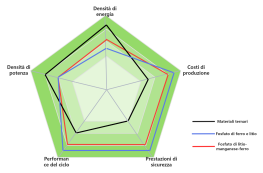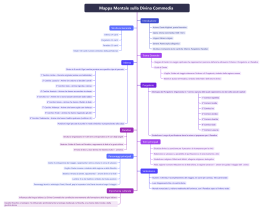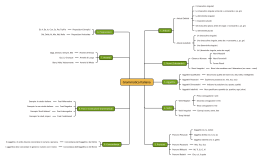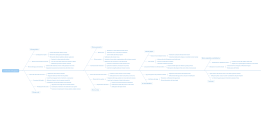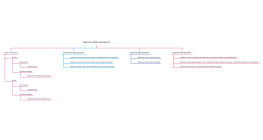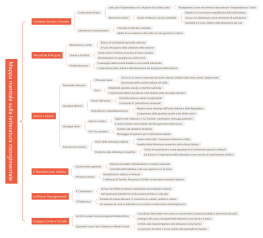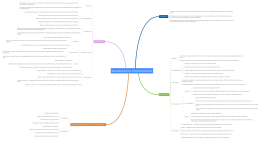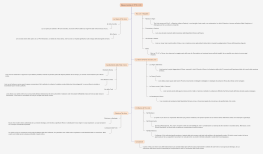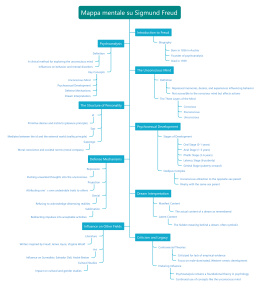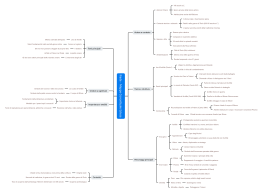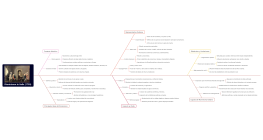Mappa mentale su Friedrich Nietzsche
2024-12-30 09:37:25 184 0 Segnala 0
0
Accedi per visualizzare il contenuto completo
Questa mappa mentale offre una panoramica sull'opera e il pensiero di Friedrich Nietzsche, filosofo tedesco nato nel 1844. Esplora la sua vita, segnata da un'educazione religiosa, studi di filologia classica e problemi di salute che influenzarono la sua carriera. Tra le idee chiave di Nietzsche figurano il 'volontà di potenza', l''Übermensch' e il concetto di 'eterno ritorno'. La mappa analizza anche la sua critica alla religione, l'influenza sulla filosofia esistenzialista e postmoderna, e le controversie legate alle interpretazioni della sua opera, tra cui l'appropriazione da parte del nazismo.
Altre creazioni dell'autore
Schema/Contenuto
1. Biographical Overview
1.1 Early Life
Born in 1844 in Röcken, Prussia. Nietzsche's father, a Lutheran pastor, died when Nietzsche was young, and his early life was marked by religious upbringing.
1.2 Education and Career
Nietzsche studied classical philology at the University of Leipzig, where he developed an interest in ancient Greek culture and philosophy.
1.3 Health Struggles
He suffered from chronic health issues, including migraines and eyesight problems, which led him to retire early from his academic career.
1.4 Later Life and Mental Collapse
In 1889, Nietzsche experienced a mental breakdown, and he spent the last years of his life in the care of his mother and sister, passing away in 1900.
2. Key Philosophical Ideas
2.1 The Will to Power
Nietzsche's concept of the 'will to power' is central to his philosophy, suggesting that life is defined by an inherent drive to assert and enhance one's power and influence.
2.2 The Übermensch (Superman)
The Übermensch represents an individual who transcends conventional morality and creates their own values, symbolizing Nietzsche's ideal of human potential.
2.3 Eternal Recurrence
The idea of eternal recurrence suggests that all events in life repeat infinitely, prompting individuals to live their lives as though they would have to live them again eternally.
2.4 Nihilism and the Death of God
Nietzsche famously declared that 'God is dead,' referring to the decline of traditional religious belief and the existential void that emerges as a result.
2.5 Master-Slave Morality
Nietzsche critiques the concept of morality, distinguishing between 'master' morality (which values power and creativity) and 'slave' morality (which values humility and submission).
3. Major Works
3.1 The Birth of Tragedy (1872)
Nietzsche's first major work, which explores the role of art and culture, particularly through the contrast between Apollonian and Dionysian forces in Greek tragedy.
3.2 Thus Spoke Zarathustra (1883-1885)
A philosophical novel that introduces the Übermensch and explores themes of individual freedom, the eternal recurrence, and the death of God.
3.3 Beyond Good and Evil (1886)
This work critiques traditional philosophy and morality, urging a revaluation of values and a deeper examination of the assumptions behind conventional moral systems.
3.4 On the Genealogy of Morals (1887)
Nietzsche examines the origins of modern moral concepts, focusing on how notions of guilt, responsibility, and ethics evolved from slave morality.
3.5 Ecce Homo (1888)
Nietzsche's autobiographical work, where he reflects on his life, philosophy, and the reception of his earlier works.
4. Nietzsche's Critique of Religion
4.1 Critique of Christianity
Nietzsche viewed Christianity as promoting weakness, meekness, and a denial of life-affirming values. He argued it emphasized suffering and submission.
4.2 The 'Will to Power' as a Response to Religious Morality
Nietzsche believed that traditional religious values needed to be overcome and replaced by the individual's will to power and self-overcoming.
4.3 The Concept of 'God is Dead'
Nietzsche's famous declaration that 'God is dead' reflects the decline of religious authority in the modern world and the subsequent challenge of creating new values.
5. Influence on Philosophy and Culture
5.1 Impact on Existentialism
Nietzsche is often considered a precursor to existentialist thinkers such as Jean-Paul Sartre and Albert Camus, due to his emphasis on individual freedom and responsibility.
5.2 Influence on Postmodernism
Nietzsche's critique of objective truth and his advocacy for perspectivism influenced postmodern philosophers, including Michel Foucault and Jacques Derrida.
5.3 Impact on Literature and the Arts
Nietzsche's ideas about the role of art, the will to power, and the Übermensch deeply influenced writers, poets, and artists, including Thomas Mann and Richard Wagner.
5.4 Influence on Psychology
Nietzsche's exploration of the unconscious and his ideas on self-creation and individual agency influenced the development of psychoanalysis, particularly the work of Carl Jung.
6. Controversies and Misinterpretations
6.1 Nietzsche and Nazism
Nietzsche's ideas were later appropriated by the Nazis, though his philosophy did not align with their ideology. His critique of anti-Semitism and nationalism contradicts Nazi principles.
6.2 Nietzsche's 'Ubermensch' and Its Misinterpretation
The concept of the Übermensch has been misinterpreted by various ideologies as a symbol of superiority, while Nietzsche intended it as a symbol of personal and spiritual development.
7. Nietzsche's Legacy
7.1 Nietzsche in the 20th Century
Nietzsche’s ideas became widely influential in the 20th century, impacting philosophy, psychology, literature, and political thought, often in unexpected ways.
7.2 Nietzsche and the Question of Morality
Nietzsche’s challenge to traditional morality continues to inspire debates about ethics, particularly regarding relativism and moral autonomy.
7.3 Nietzsche's Influence on Modern Thought
Nietzsche's critique of truth, his exploration of power dynamics, and his call for individual authenticity have made him a key figure in modern intellectual movements.

Raccogliere
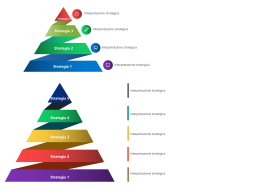
Raccogliere
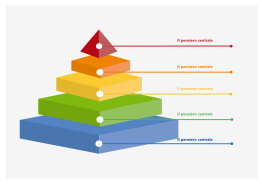
Raccogliere
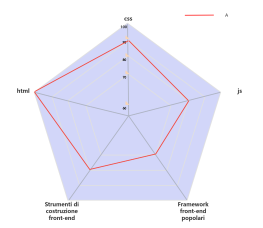
Raccogliere
0 Commenti
Pagina successiva
Consigliato per te
vedi di più

